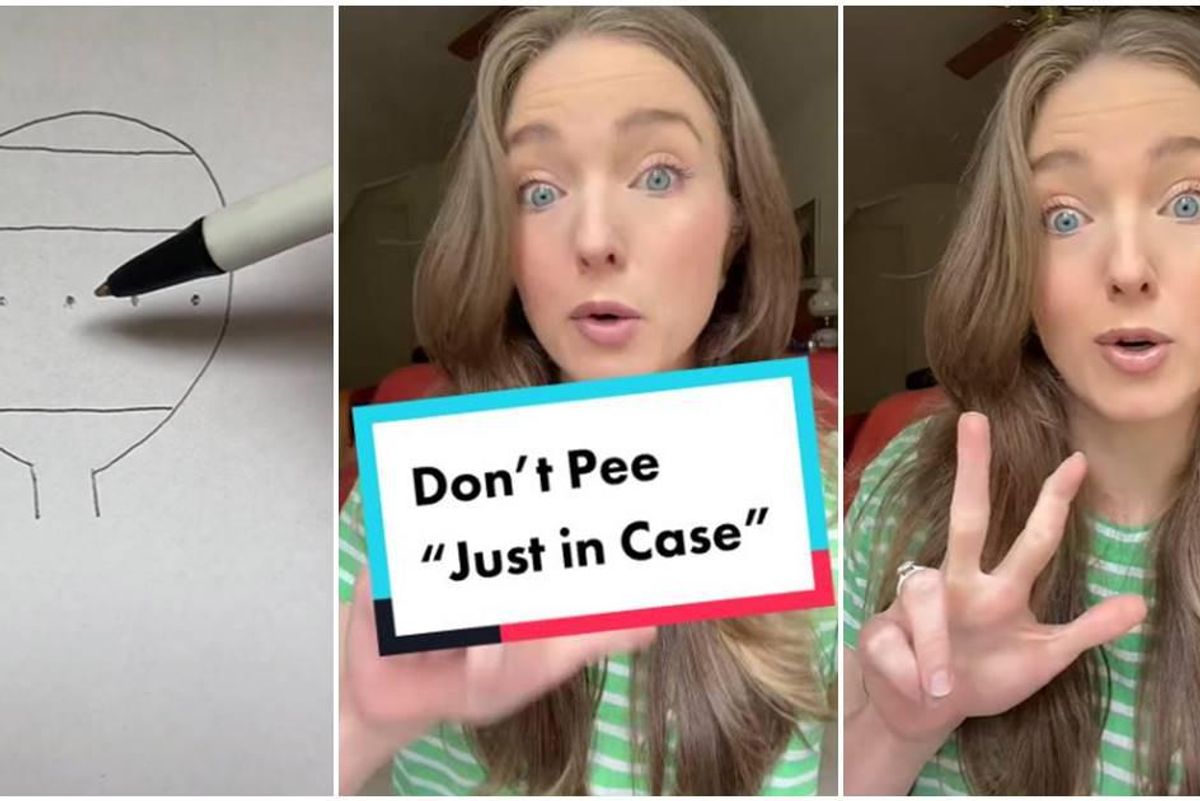Pelvic floor doctor explains why going pee ‘just in case’ is a really bad idea
Nobody saw that coming.

Dr. Alicia Jeffrey-Thomas teaches you how to pee.
A pelvic floor doctor from Boston, Massachusetts, has caused a stir by explaining that something we all thought was good for our health can cause real problems. In a video that has more than 5.8 million views on TikTok, Dr. Alicia Jeffrey-Thomas says we shouldn’t go pee “just in case.”
How could this be? The moment we all learned to control our bladders we were also taught to pee before going on a car trip, sitting down to watch a movie, or playing sports.
The doctor posted the video as a response to TikTok user Sidneyraz, who made a video urging people to go to the bathroom whenever they get the chance.
Sidneyraz is known for posting videos about things he didn’t learn until his 30s. "If you think to yourself, 'I don't have to go,' go," SidneyRaz says in the video. It sounds like common sense but evidently, he was totally wrong, just like the rest of humanity.
@sidneyraz on vacation and remembering #vacation #tips #bathroom #travel #tipsandtricks #todayilearned #todayyearsold #islandlife #traumabrain #roadtrip #inmy30s
"Here's why you shouldn't go 'just in case.'"
“Pelvic floor physical therapist here, and I work with a lot of people with overactive bladders, stress incontinence, urge incontinence, the whole nine yards,” Dr. Jeffrey-Thomas began her clip. “And here's why you shouldn't go ‘just in case."'
In the video, Dr. Jeffrey-Thomas explains the three levels of feeling the need to pee.
“The first one is just an awareness level that tells you that there's some urine in the bladder,” she said. “The second one is the one that tells you to make a plan to use the toilet, and the third is kind of the panic button that says, ‘Get me there right now, I'm about to overflow.’”
Then she made her case by giving a visual explanation of how going when we don’t need to teaches our bodies to prematurely send signals that it’s time to pee. The simple explanation has a lot of people wondering if their pee sensor is still working correctly.
TikTok can be used to teach science. Yes, even about going to the bathroom.
@thepelvicdancefloor #stitch with @sidneyraz I know it sounds counterintuitive and goes against everything your momma taught you - just out here trying to save your bladder 🤍
In a rare display of humility on the Internet, Sidneyraz saw the video and thanked the doctor for the correction. "Oh hey, thanks for correcting me!" he wrote.
The video shocked a lot of people who feel like their entire lives have been based on a lie—at least when it comes to something most of us do six to eight times a day. “TikTok is basically just a bunch of videos telling me I'm doing life wrong,” joked one commenter. “Like Jesus, really? I'm peeing wrong?”
Yes, you are.
Finally, some bathroom science you can take with you
"Who else hears their mom in their head say 'go just in case' when you’re out and about and near a bathroom?" another commenter asked.
The good news is that if you’ve always been the type to go “just in case” and you constantly feel like you need to go pee, there is hope. With the help of a doctor, you can retrain your bladder so that you only feel the need to go when it’s time. Now, who’s going to be the first brave person who doesn’t go when they feel the need, just to see if their body’s pee sensor is off? We wish you good luck.
This article originally appeared three years ago.
- 5 things I learned as a foster dog parent and the 1 reason why I keep ... ›
- Doctor reveals life saving tip for drinking on TikTok - Upworthy ›
- Why you shouldn't pee in the shower - Upworthy ›
- Mom wants boys to sit to pee and dad to clean if they stand - Upworthy ›
- Doctor reveals the weird toilet position that helps you poop - Upworthy ›
- Women peeing 'like a cowboy' could empty an additional half cup of urine - Upworthy ›
- A guy went viral for tracking the taste of his own urine. Doctors used to do it all the time. - Upworthy ›



 A Generation Jones teenager poses in her room.Image via Wikmedia Commons
A Generation Jones teenager poses in her room.Image via Wikmedia Commons




 A woman getting her nails painted.via
A woman getting her nails painted.via 
